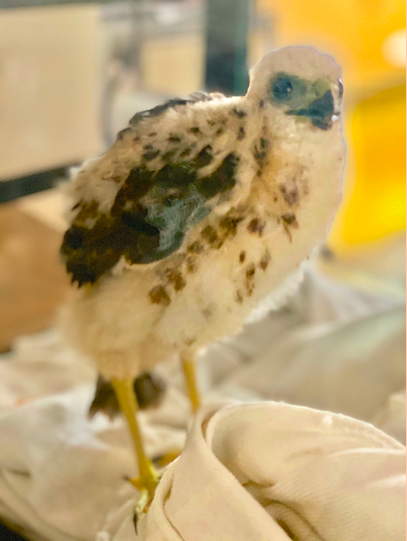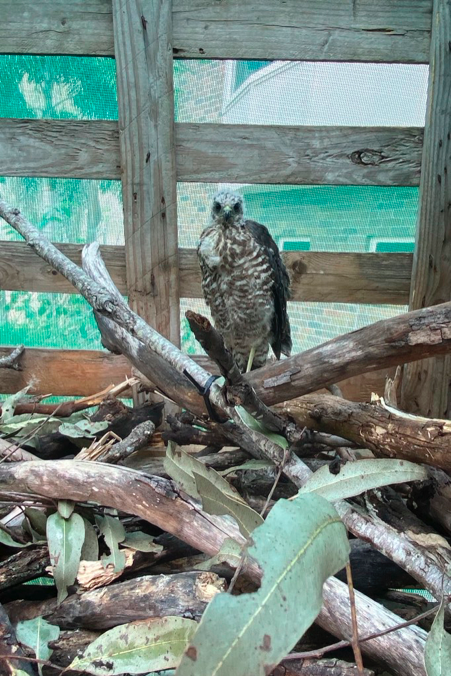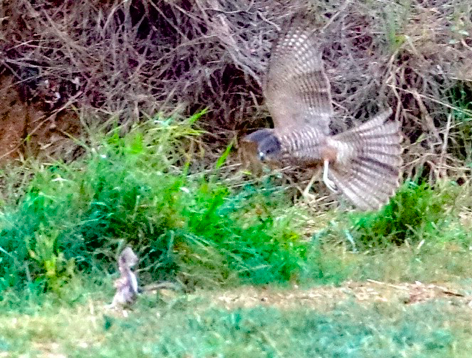Late one afternoon my grandson arrived at the door with a noisy bundle of feathers. The bird, a Sparrowhawk was found on the road that is adjacent to our properties and services the Goldmont Estate off Gold Creek Road. I warmed the bird up and placed it in a heated Lizard Terrarium to stabilize it overnight. From its awareness of my movements and his screeching it obviously needed food, so I tried pinkie mice and de-frosted quail chicks which I halved. It didn’t need much encouragement and two hours after he was pushed out of its nest it was taking what seemed enormous amounts of food in relationship to its size.

Colin when we found him, 13/11/2019
I had heard the parents calling and had ideas of releasing the bird near them in hope they would continue to raise the chick. I couldn’t get near enough to them mainly because the Mickey Birds (Noisy Miners) were seeking us out and making screeching runs on the parents. I found their nest which was very sparse for a hawk and inexplicably right over the roadway in the middle of Mickey Bird territory. I am pretty sure the Mickies were responsible for pushing the youngster out of the nest.
I have never experienced a bird eating so vigorously or so much for its size. A week later and it was exercising its wings and nearly ready for flying. I made a nest out of a used packing case with shade cloth, an approximation of a “hacking box” that the raptor people use. It was located not far from the house in a densely planted area of wattles and taller eucalypts.

Colin in the Hacking cage 21/11/2019
The bird took to it almost too quickly and after only one night in the bush it took off and left me worried it wouldn’t have enough time to adapt to the wild. I find it difficult to write about “him” or more correctly “it” as I have no idea of its sex. I had such a close and intensive relationship with it that it was named Colin by Michelle Johnston with whom I shared my experience. Of course, it was just as likely to be a Coleen.
Later in the afternoon I heard the familiar vigorous calling, so I took out some defrosted quails and placed them in a hanging dish. A soon as I moved back, Colin came flying in and grasped at the food without stopping at all and made a clumsy landing in a dense branch of a large wattle. This became a regular routine and Colin would cry from a high point until I came out with some food. He got better at grasping the food and landing and in no time, I would throw a half-grown quail in the air and Colin would appear from his hiding spot and catch the quail before it hit the ground. After about two weeks Colin would be missing in the early morning but turn up later in the day for a feed. It became clear he was gradually finding his own food.

Colin diving in to catch a defrosted quail before it touches the ground, 21/12/2019. This was one of the last times we saw him until his three appearances chased by the Mickey birds in October 2020.
Forty-two days after Colin was found he didn’t come back and I thought that was the end of a brilliant interaction with one our wildest predators that I’m sure I will never forget. I wondered what impact my rescuing him was. Was he taking one duckling a day? I see several Black or Wood Ducks which usually start with about 12 day-old ducklings and every day this reduced until they have only 2 or 3 survivors. Sparrowhawks would be number one suspect for these losses. My act of saving Colin in the last year would possibly be responsible for more than a hundred ducklings, finches, wrens, and even rarer ground birds such as Button Quails, Pittas and Thrushes dying every year.
But I thought he may not have survived.
However almost exactly a year after Colin released himself, I was out in the garden near the Hacking Cage and I heard the unmistakable strident call from the Wattle clump near the tray on which I used to feed him. It was the same bird. I was just about to go and get Colin some food when the Mickies came in and pushed him from one perch to another until he had had enough and flew off. This has been repeated twice since, so I am sure he is doing well, but he is just another bird that the Mickies can run off. By planting trees and mowing or grazing the grass underneath we are encouraging Mickies and other vigorous birds. They are excluding less dominant species such as finches, wrens and small honeyeaters and making our enjoyment of our flora poorer. However, I didn’t realize their impact on larger birds although I regularly see them chasing other raptors including the closely related Brown and Grey Goshawks.
Small acts like mine in saving this Sparrowhawk or larger programmes of removing weedy habitat and planting mainly trees, have rather large and not necessarily positive impacts on the fauna of our catchment. It is rather humbling to be involved but it is very clear that we must be careful when we choose to be involved as we are not in control of the consequences.

